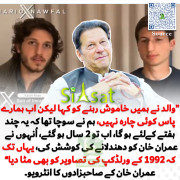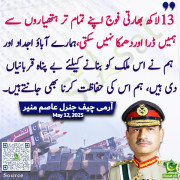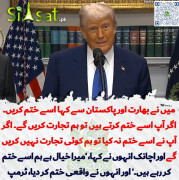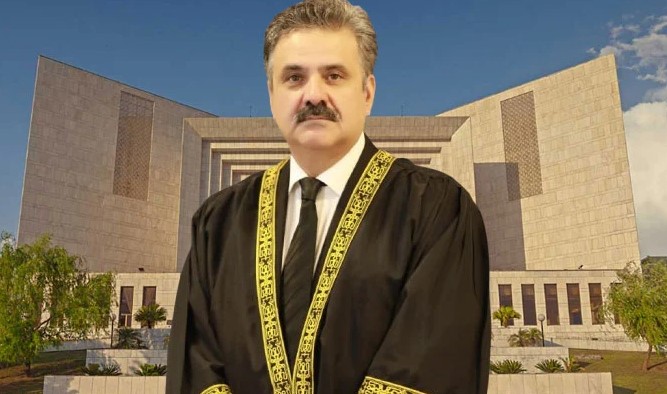JusticeLover
Minister (2k+ posts)
Indian national Uzma Ahmed, who was forced to marry a Pakistani national returned to India following an Islamabad High Court order via the Attari-Wagah border on Thursday.
"You can go to Pakistan easily, but you can't come out of it. Pakistan is like a well of death. Once you are stuck, you are stuck," Uzma said while sharing her harrowing experience in a press conference on Thursday.

A resident of Delhi, Uzma is in her early 20s and was forced to marry Tahir Ali on gunpoint on 3 May. Uzma had met Ali in Malaysia. On Thursday, she gave a detailed account of her experience in Pakistan and how she went to Islamabad and took refuge in the Indian High Commission for 20 days before she could return home.
"I had gone to Pakistan for sightseeing. But none of that happened. I had gone there on 1 May and had plans to return on 10 or 12 May. The situation changed all of a sudden. When I reached there I realised it was a very strange village. The people were strange and spoke a strange language. Nothing was right there. I don't have words to explain it. If you search Guner, you will find out that it was under Taliban control from 2008 to 2010 and military exercises are conducted there.
"Tahir tortured me emotionally as well as physically. He even threatened to harm my child through his relatives in Delhi. He threatened to kidnap my child and kill her if I didn't do as they said. They beat me. It was because of my daughter that I signed (the marriage contract). It was because of fear that I signed. But I managed to escape the place," she said.
"If I was there for three-four more days I would not have survived. They would have either sold me or used me in some risky operation. Most people from Guner work in Malaysia. They bring girls from there. Every house has two-three wives. I don't want whatever that happened to me to happen to anyone else. There are many girls who are not able to escape the place," she added.
According to JP Singh, an Indian High Commission official, who managed her case, she reached the Indian High Commission on 5 May and told them that she was an Indian national. "I remember her scared face when she came to the window. It was a troubling time to make a decision and it was a difficult decision too. It was difficult because it was not easy to keep someone inside the commission. But once I saw her face, it became easy to keep her inside. It was a learning experience for all of us," he said.
"The High Commission trusted me instantly. When I told them that I am Indian and have come from India, he (Singh) immediately took me inside. I was safe inside," said Uzma who spent 20 days inside the Indian embassy before she was cleared to leave Pakistan.
According to reports, soon after she was taken inside the embassy, Ali filed a petition in Islamabad. Uzma petitioned the Islamabad High Court on May 12 that she was forced to marry. She filed another petition soon, asking "she be allowed to return home urgently as her daughter from her first marriage in India suffered from Thalassemia — a blood disorder". Ali petitioned the court requesting that he be allowed to Uzma. The court allowed the meeting but Uzma refused, the Times of India had said.
"Lots of girls think that it's Muslim culture and you will be safe. I will tell them not to go to Pakistan. Even men are not safe there. I am happy that I am here. All girls who have gone there even via arranged marriage are in a very bad condition. My experience has told me that there's no place like India. Women have a lot of power here," Uzma said on Thursday.
You can hear a detailed account of her experience in Pakistan here:
Speaking with the media, Minister of External Affairs, Sushma Swaraj said that she was relieved after Uzma crossed the Wagah border.
"It's a big thing that an Indian woman in a time of distress is able to look up to the Indian High Commission with hope. The common thread in all this is that once she said that she is Indian national everything else was not important. The embassy is made for Indian nationals."
Swaraj also stressed on how the Pakistan home ministry and foreign ministry helped Uzma despite the ongoing tension between India and Pakistan.
"If Uzma is here, it's also because Pakistan's foreign office and home ministry were very helpful. Our barrister Shah Nawaz Noon fought the case very well. I am also grateful to Justice Kayani who presided over the case. I remember when Tahir told him that Pakistan's prestige was involved. He replied asking how was it an India-Pakistan issue."
Swaraj added, "An estranged daughter has met his mother, the way an Indian daughter has come back, in all this, this is a sigh of relief. Two mothers-daughters have met today."
Published Date: May 25, 2017 07:33 pm | Updated Date: May 26, 2017 12:46 am

her image in reaching back in endia

her image in pakistan
Veiled in pakistan no veil in endia, hypocrisy at its peak.
"You can go to Pakistan easily, but you can't come out of it. Pakistan is like a well of death. Once you are stuck, you are stuck," Uzma said while sharing her harrowing experience in a press conference on Thursday.

A resident of Delhi, Uzma is in her early 20s and was forced to marry Tahir Ali on gunpoint on 3 May. Uzma had met Ali in Malaysia. On Thursday, she gave a detailed account of her experience in Pakistan and how she went to Islamabad and took refuge in the Indian High Commission for 20 days before she could return home.
"I had gone to Pakistan for sightseeing. But none of that happened. I had gone there on 1 May and had plans to return on 10 or 12 May. The situation changed all of a sudden. When I reached there I realised it was a very strange village. The people were strange and spoke a strange language. Nothing was right there. I don't have words to explain it. If you search Guner, you will find out that it was under Taliban control from 2008 to 2010 and military exercises are conducted there.
"Tahir tortured me emotionally as well as physically. He even threatened to harm my child through his relatives in Delhi. He threatened to kidnap my child and kill her if I didn't do as they said. They beat me. It was because of my daughter that I signed (the marriage contract). It was because of fear that I signed. But I managed to escape the place," she said.
"If I was there for three-four more days I would not have survived. They would have either sold me or used me in some risky operation. Most people from Guner work in Malaysia. They bring girls from there. Every house has two-three wives. I don't want whatever that happened to me to happen to anyone else. There are many girls who are not able to escape the place," she added.
According to JP Singh, an Indian High Commission official, who managed her case, she reached the Indian High Commission on 5 May and told them that she was an Indian national. "I remember her scared face when she came to the window. It was a troubling time to make a decision and it was a difficult decision too. It was difficult because it was not easy to keep someone inside the commission. But once I saw her face, it became easy to keep her inside. It was a learning experience for all of us," he said.
"The High Commission trusted me instantly. When I told them that I am Indian and have come from India, he (Singh) immediately took me inside. I was safe inside," said Uzma who spent 20 days inside the Indian embassy before she was cleared to leave Pakistan.
According to reports, soon after she was taken inside the embassy, Ali filed a petition in Islamabad. Uzma petitioned the Islamabad High Court on May 12 that she was forced to marry. She filed another petition soon, asking "she be allowed to return home urgently as her daughter from her first marriage in India suffered from Thalassemia — a blood disorder". Ali petitioned the court requesting that he be allowed to Uzma. The court allowed the meeting but Uzma refused, the Times of India had said.
"Lots of girls think that it's Muslim culture and you will be safe. I will tell them not to go to Pakistan. Even men are not safe there. I am happy that I am here. All girls who have gone there even via arranged marriage are in a very bad condition. My experience has told me that there's no place like India. Women have a lot of power here," Uzma said on Thursday.
You can hear a detailed account of her experience in Pakistan here:
Speaking with the media, Minister of External Affairs, Sushma Swaraj said that she was relieved after Uzma crossed the Wagah border.
"It's a big thing that an Indian woman in a time of distress is able to look up to the Indian High Commission with hope. The common thread in all this is that once she said that she is Indian national everything else was not important. The embassy is made for Indian nationals."
Swaraj also stressed on how the Pakistan home ministry and foreign ministry helped Uzma despite the ongoing tension between India and Pakistan.
"If Uzma is here, it's also because Pakistan's foreign office and home ministry were very helpful. Our barrister Shah Nawaz Noon fought the case very well. I am also grateful to Justice Kayani who presided over the case. I remember when Tahir told him that Pakistan's prestige was involved. He replied asking how was it an India-Pakistan issue."
Swaraj added, "An estranged daughter has met his mother, the way an Indian daughter has come back, in all this, this is a sigh of relief. Two mothers-daughters have met today."
Published Date: May 25, 2017 07:33 pm | Updated Date: May 26, 2017 12:46 am

her image in reaching back in endia

her image in pakistan
Veiled in pakistan no veil in endia, hypocrisy at its peak.
Last edited by a moderator:
































